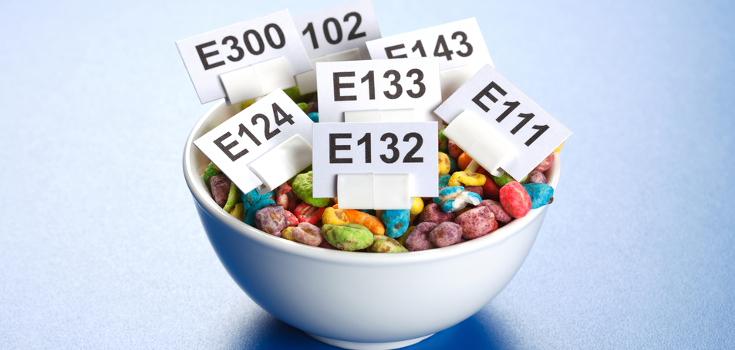FDA Database: 93% of Food Additives Aren’t Properly Studied
FDA Database: 93% of Food Additives Aren’t Properly Studied
FDA’s indifference to food additives is strange
If the mandate of the FDA includes protecting public health by assuring the safety of the food supply, why is the organization allowing a staggering amount of additives to adulterate our food?
If the mandate of the FDA includes protecting public health by assuring the safety of the food supply, why is the organization allowing a staggering amount of additives to adulterate our food? Many of these additives have dire consequences to the health this agency is supposed to protect.
Since the advent of commercially processed foods in the 1950’s, many non-food substances have come into common usage to preserve and enhance the taste and appearance of products made with cheap ingredients. Increasingly, these additives such as indigestible gumshave been used to replace real food ingredients. The use of food additives has allowed food producers to make higher profits at the expense of public health.
Today, thousandsof different food additives are allowed by the FDA, although a 2013 studyfound that almost 80% of them lack the relevant information needed to estimate the amount that consumers can safely eat.
In the FDA’s own database, 93% of food additives lack reproductive or developmental toxicity data. Of the totality of FDA-regulated additives, both directly and indirectly allowed in food, almost two-thirds don’t have publicly available feeding data. The report concluded that in the absence of toxicology data on the majority of chemicals added to food, their safety in humans may be questioned.
To explain the FDA’s negligence, some cite a decades-old loopholethat allows companies to confer GRAS (generally recognized as safe) status to the additives they plan to use, without any FDA oversight. But if the FDA were genuinely interested in protecting the public, it would have moved long ago to close that loophole.
Read: 4 Ways the FDA has Failed Us
The same apologists say companies regularly introduce new additives without ever informing the FDA, so this regulatory body just doesn’t know about them. Yet the FDA has been able to trackdown small raw milk producers half way across the country to put them out of business, send the FBI to raid a cancer center using natural treatments in Tulsa treatment, and put a small company out of businessfor making elderberry juice concentrate. Clearly the FDA has its ear to the ground.
Protecting Ourselves – Commonly Used Dangerous Food Additives
So if the FDA is unwilling to do its job and keep us safe, the only alternative is to protect ourselves. The best way to start is by scrutinizing the label of every food item before buying. If there is a listing that is not food, chances are good it is referring to a food additive. Do some research and decide whether you want the substance in your body.
Here are a few of the most commonly used dangerous food additives:
BHT and BHA – These are preservatives for fats and oils. They are found in cereals, vegetable oil, potato chips, popcorn, and other packaged foods. Both can be found in Harry and David’s popular Moose Munch bars. Studies have concluded that BHT and BHA may cause cancerin rats.
Azodicarbonamide – A chemical used in the rubber and plastics industries to produce shoe soles and yoga mats. It’s also used as a dough conditioner in low quality breads, other baked goods, and in the buns and breads used in several fast food chains. Subway has agreed to discontinue its use, but didn’t set a time frame. Azodicarbonamide has also been found to cause cancerin rodents.
MSG – MSG is an excitotoxin that makes below average food taste good. It’s in many salad dressings, potato chips, hot dogs, canned soup and tuna, frozen dinners, prepared gravies and much more. It kills sensitive neurons in the brain. According tonatural health authority Russell Blocklock MD, there is a link between sudden cardiac death and excitotoxic damage caused by MSG and artificial sweeteners.
Acesulfame-K – This additive is replacing toxic aspartame in products such as candy, drinks, chewing gum and anything else that’s sweet. And as is usually the case, it is as deadly as what it replaces. Acesulfame-K is a potassium salt containing methylene chloride, a known carcinogen. It may also cause liver and kidney impairment, and problems with eyesight.
Sodium nitrate – Sodium nitrate is a preservative used in conventionally-produced bacon, ham, hot dogs, lunch meats, and other processed meats. Nitrates can be converted to cancer-causingchemicals known as nitrosamines.
Blue 1 and Blue 2 – These are food dyes used in beverages, candy, and baked goods. Blue 2 is also used in pet food. Both have been found to hyperactivity and potentially cause brain tumorsin mice.
Red 3 – Another food coloring used in bottled cherries, fruit cocktail, candies, and baked goods. Causes thyroid tumorsin rats and maybe in humans too.
Yellow 6 – Still another food dye which is found in pickles, peperoncini, and sausages, as well as gelatin, baked goods, and candy, yellow 6 may causeadrenal gland and kidney tumors.
We can only guess the agenda of the FDA. But once you start reading labels, don’t be surprised if it becomes an empowering habit!
Image credit: NationofChange
Other Popular Stories:

Post a Comment